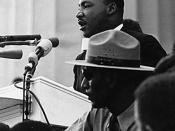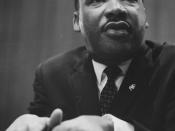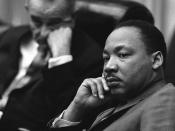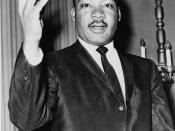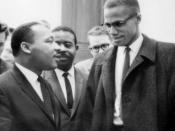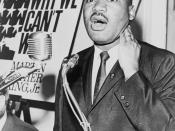Martin Luther King, Jr. was sitting in the Birmingham jail when he received a letter from white clergymen of the town that expressed their thoughts of his recent protest. Believing that this one letter was written with professional and respectful intentions he responded with a long letter answering their questions. First, Mr. King clarified why he was in the area, because he had organizational ties there. He then goes on to explain some of the attempts the Negro community had made in Birmingham to stop segregation and police/law brutality only to see broken promises and rejected negotiations. He also made a good point of how it may never seem like the right "time" for action but "justice prolonged is justice rejected". Also, he went into detail on how everyone should obey just laws and yet breaking the unjust laws are doing a favor to the judiciary system and he explained his reasoning behind why certain laws are considered unjust.
Basically, his entire letter was a response to the one he was writing about. The one, noted paragraph discussed direct action and why nonviolent protests were the way Mr. King had insisted on. They seem to cause a lot of tension, which in turn keep people's opinions from settling down on thoughts implanted on their mind from society. He used Socrates as a wonderful simile showing that that tension ignites people to think for themselves and rise from prejudices and racism to move on towards an inevitable peace. However, I'm sure the reader didn't want to listen to these great points Mr. King had to say just as the jury refused to hear Socrates. Do you think Mr. King died with as much content as when Socrates was put to death for the exact same crime?
